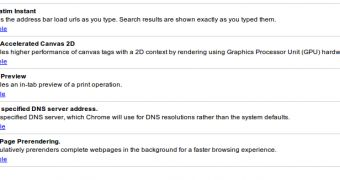Ever since it was introduced, the Chrome Labs section has been a treasure trove of new features and interesting experiments and the Google team continues to add new technologies and test ideas with it. The latest experiments to land, only in Chromium for now, are Verbatim Instant and Web Page Prerendering, both aimed at improving the speed of the browser.
A few weeks back the Chrome Labs section was renamed and moved to "about:flags" to better reflect its use and the experimental status of the features in it. Technically, the experiments are command line flags that enable functionality built into Chrome but not enabled by default.
Verbatim Instant
"Instant" has been available in the dev channel builds for quite a while now. With the Google Chrome 8 beta, the feature has been graduated, though it's still not enabled by default.
Just like its search counterpart, Chrome Instant loads pages as you type in the Omnibox and provides predictions based on your history, bookmarks and web suggestions.
In the Chromium about:flags section though, you'll now see the Verbatim Instant experiment. While the feature is very similar to the previous Instant experiment, there is one crucial difference, search pages are loaded based on what you've typed so far not on what Chrome is predicting, hence the 'verbatim' moniker.
Web Page Prerendering
A completely new feature in about:labs is Web Page Prerendering which is described as "Speculatively prerenders complete webpages in the background for a faster browsing experience."
Details are scarce at the moment, but it would seem to imply that the feature pre-loads web pages even if you haven't specifically clicked on a link to them.
This way, when you do click on the link, or the page is finally needed, it is already loaded and ready to be displayed, practically instant.
Of course, the browser couldn't load every link on a page, but, by looking at your history and past actions, it can predict which page you are going to visit next.
When this works, the results should be pretty impressive, even if Chrome is no slouch as it is.
At this point, it's unclear if any of this functionality has been enabled. In any case, it is expected to be a part of Chrome proper no sooner than February 2011.

 14 DAY TRIAL //
14 DAY TRIAL //